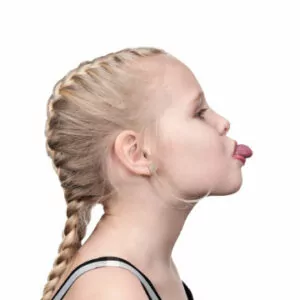 SCOTTS VALLEY, SANTA CRUZ, CA
SCOTTS VALLEY, SANTA CRUZ, CA
According to data from the Centers for Disease Control and Prevention, about one in every 54 children has been identified with a disorder somewhere on the autism spectrum. The number of cases of Autism continues to grow, with the number of children with autism spectrum disorder (ASD) now surpassing all children combined affected by diabetes, AIDS, cancer, cerebral palsy, cystic fibrosis, muscular dystrophy, and Down syndrome. Typically, an ASD diagnosis is made by a pediatrician or psychologist, but there may be oral health signs that signal autism spectrum disorder. Read on as your Scotts Valley family dentists at Ebrahimian Integrative Dentistry explain how tongue thrust could be a sign of ASD.
What is tongue thrust?
Tongue thrust is the result of improper swallowing patterns. The proper tongue pattern when swallowing is the tongue moves in a roll-like motion, from the tip to the back of the throat, while the tongue presses gently against the roof of the mouth. In cases of tongue thrust, the tip of the tongue moves forward, pressing against the backs of the front teeth. Your child might have tongue thrust if they show food when eating, are picky eaters, gag easily when eating or have gapped front teeth. Severe dental misalignment or upper front teeth that jet forward could also be a result of tongue thrust.
What is autism spectrum disorder?
ASD is a life-long disorder involving developmental disability stemming from neurological dysfunction of the brain. Those living with ASD may experience issues with their ability to communicate, function socially, or their general behavior. Because there is a spectrum of different issues that qualify as ASD, the symptoms that manifest could be mild or very severe.
How are tongue thrust and ASD linked?
While rather common in children, tongue thrust also can be indicative of a developmental delay such as ASD. Tongue thrust and other oral behaviors are considered examples of stimming—the term used to describe repetitive movements or noises, which autistic children and teens often do as a coping mechanism during overwhelming situations. However, there are other oral signs that may be evident in a child with ASD. Individuals with developmental disabilities such as ASD are more likely to engage in bruxism—the clinical term for clenching or grinding your teeth. Additionally, children with ASD are more likely to cause injury to themselves, which may result in broken or chipped teeth. According to studies, other oral habits that may indicate ASD include nail-biting or chewing on pens and pencils and mouth breathing.
The Importance of Proper Dental Care
At Ebrahimian Integrative Dentistry, our dentists have the training to identify conditions like bruxism and tongue thrust and present any concerns to parents.
Proper dental care is important for all of us, but people with ASD are at a higher risk for tooth decay and cavities for the following reasons:
- Oral hygiene may not be as high a priority given the other care needs
- Using food as motivation in therapy and/or behavior modification could lead to frequent snacking
- Certain people with ASD may find brushing and flossing overwhelming
- Improper chewing and swallowing due to motor deficits, which could lead to food pouching in the mouth
Because children with ASD are more likely to suffer from oral health concerns, it is essential to encourage your child to practice good oral hygiene and stick to routine dental checkups. Also, we recommend that you consult with a myofunctional therapist in Scotts Valley if your child with ASD also deals with tongue thrust or other oral habits affecting their oral health or dental development.
Family Dentistry in Santa Cruz
While tongue thrust does not always mean that a child has Autism, it just makes dentists and your dental care team acutely aware of the possibility. This is helpful in how your child receives attention and care during their treatment so that they have the best experience possible. You can trust the team at Ebrahimian Integrative Dentistry to care for any member of your family. If you are concerned about tongue thrust or other habitual oral behaviors your child is exhibiting, make an appointment today. Visit us online or call (831) 438-4411 if you live in the areas of Los Gatos, Santa Cruz, and Scotts Valley in California.